What is Science Fiction?
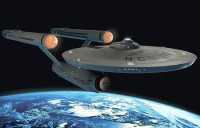
I recently asked the question, "What is Art?" Answering that one is a real challenge, and the answer may be entirely subjective. This time I'm asking a question that is almost as difficult: "What is Science Fiction?" The answer may turn out to be just as subjective, and just as much of a challenge, but I've always thought the tough questions are the most interesting to explore.
I may, or may not, be an artist (but I know what I like!), and suffice to say I have only dabbled in art over the years. Science fiction, however, has filled my life as long as I've been picking my own reading material. I suspect that, overall, my fiction reading (and I read a lot of fiction) is at least 80% science fiction. It could be more. Most normal fiction leaves me disinterested, no matter how insightful it might be. I live in the real world; I want stories that take me far, far away, be it conceptually, spatially or temporally (if only temporarily).
Only authors that bring something newly invented to the table really hold my interest.
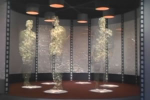
And science fiction is all about new ideas!
At its best, science fiction allows one to imagine a new idea and then see what happens when that idea is applied.
A classic example might be Larry Niven's short stories that imagine a world where teleportation is trivial and cheap (like taking a bus). He explores what that implies for crime or flash crowds. What happens when crooks can be thousands of miles away in seconds? What happens when networked people can be anywhere in seconds?
Just imagine 500,000 Twitter followers who hear about a great concert happening right now. Or what if it's a riot? How big can a crowd get before the police shut down the system? One of Niven's stories explores that very thing (long, long before Twitter or even the interweb existed).
By the way, I don't know about you, but I have never been successful in turning an adult on to science fiction. It appears to be a form of story telling that you glom onto early in life or not at all. I'm not sure if this says something about how science fiction grows your mind or something about minds being able to "get" science fiction. But it does seem the world breaks into those who like it and those who absolutely aren't touched by it.
Anyway, for whatever it's worth, here's my take on,…
What is Science Fiction?
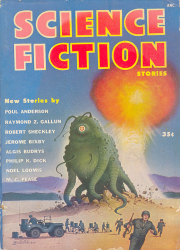
What defines a work of fiction as science fiction?
That question is almost as difficult to answer as is the one about art.
A meta-question in both cases is whether the answer is purely subjective or are there some objective criteria that apply.
I believe that in both cases, there are some objective criteria, but also that some aspects are matters of individual taste and perception.
Science Fiction and Fiction
What makes science fiction hard to pin down is that, like art, it is very large in scope. Lots of things are art; lots of fiction is science fiction. In fact, I think that it comes close to being a primary classification almost on par with the 'fiction' class itself. I tend to think of my library as composed of technical, non-fiction, reference, fiction and science fiction. I see each of those as distinct.
The reason for this broad classification is that science fiction contains many of the same genres as does ordinary fiction. In my library I have detective SF, mystery SF, philosophical SF, romantic SF, sexy SF, historical SF, adventure SF, psychological SF, and more. Science fiction is a platform for fiction.
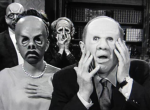
[One of the interesting differences between science fiction and ordinary fiction is how often science fiction keeps the reader in the dark! The classic science fiction short story keeps the reader unaware of some key element until, ideally, the very last line. You see this at play in many Twilight Zone episodes, for example.]
But what divides science fiction from fiction? An obvious definition operates from the name itself: science fiction is fiction where science is a key element of the story. Both concepts are crucial, and since the science part can get a bit tricky, let's quickly deal with the easy one: fiction. The movie Apollo 13, for example, was a great movie, but it wasn't science fiction (unless you actually believe NASA faked the moon landings).
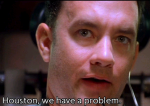
What is important here is that Apollo 13 took place in the real world and not only follows real world physics and science, but real world events. Apollo 13 is a dramatic documentary (making it fictionalized non-fiction). It is definitely not science fiction!
Fantasy
It's the other word, science, that launches the fiction into space (or some other fantastic realm). But some wish to include science fiction's sister, fantasy, under the umbrella, so they often refer to it all as speculative fiction. Others see the siblings as clearly related, yet distinct, and refer to them as science fiction & fantasy. The crux of the difference between the two is whether the story's reality uses some form of magic. A fantasy, by definition, takes place in a world where magic is is part of that world.
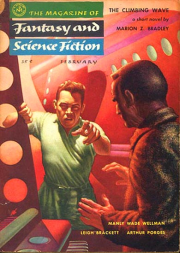
In this case "magic" refers to anything that goes beyond the physics of reality (even a science fictional physics). Technology so advanced that, per Arthur Clarke's third law, it looks like magic does not make a story a fantasy. The key question is whether the story is fully explained by the natural world or whether a supernatural element is required.
In particular fantasy stories involve the idea of being able to invoke magic or do spells. Wizards and witches are clearly fantasy along with flying carpets, unicorns and vampires. The same is true of Santa Claus (sorry Virginia!), the Easter Bunny, Paul Bunyon, Jack Frost, the Tooth Fairy, zombies and ghosts.
Actually, most zombie stories do have natural explanations (chemicals, meteor dust, biological agents, etc.). In fact, like Frankenstein, many zombie stories are really parables about science gone horrible wrong. The fantasy part comes from the impossibility of animating dead flesh. And this just illustrates how murky classifying science fiction (& fantasy) can be. Ghosts, vampires, and some monsters, can be argued to be part of the natural world, which makes them just scary fiction, not science fiction!
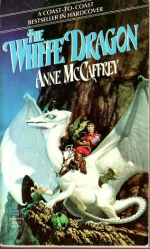
There are other very inventive stories that take fantasy elements out of the fantasy world by providing natural explanations for them. Anne McCaffrey's Dragonriders of Pern series is an almost canonical example. Dragons as real beings specially bred to solve the problem of 'Thread.' Other examples include stories that, as mentioned above, provide biological explanations for vampires or zombies, or stories that explain magic as a special form of mathematics or quantum physics.
Speculative Fiction
The science/fantasy line is so tricky that, as mentioned above, some resort to calling all speculative fiction. This simplifies the definition: speculative fiction is fiction where speculation is a key element of the story. The nice thing is that the term covers historical fiction, future fiction and fantasy fiction under one umbrella.
Historical fiction, by the way, is an interesting category. On the one hand there are works that as fictionalized accounts of real events or pure fiction that takes place at some point in history. An excellent example of the latter is Ken Follett's outstanding novel, Pillars of the Earth. Such works are not science fiction. On the other hand, there is historical fiction that imagines history turning out differently. For example, that the Roman Empire didn't collapse but survived to become the foundation of the modern world (we all speak Latin!). Such works, because they involve an alternate reality, are considered science fiction.
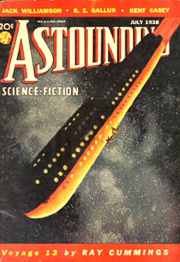
With regard to speculative fiction, the immediate objection is that speculation is part of all fiction pretty much by definition. This means that either the label is redundant and useless, or it refers to an extra degree of speculation compared to other fiction. And the term, speculation, is a vague enough to cover rocket ships and dragons. So the question is, "What constitutes speculation?"
A good answer is that speculation involves events that could not happen right now (or did not happen). If the story depends on magic or advanced technology to work, then it could not happen right now, and it is speculation. If the story depends on a different physics (warp drive, for example) or other science elements unknown to us now, that is also speculation.
And at long last we come to…
My Definition of Science Fiction
For me, the simple, but vital, characteristic of science fiction is that it contains aspects not possible in the world we know. However, I do distinguish between science fiction and fantasy (I consider them separate genres), and I do not use the term speculative fiction (no big reason, really; I just don't).
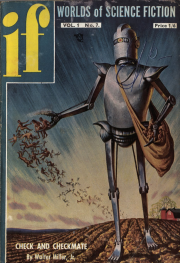
A simple form of my definition is, "Science Fiction is fiction with science + imagination." In this definition, both science and fiction are freely defined, but adhere to the natural world principle. That is, any fantastic element, no matter how fantastic it is, must be grounded in some form of (fictional) physics.
To be science fiction, a story must be (more or less) explained by the physics of that reality. The physics is allowed to be wildly improbable or even impossible. Various forms of warp drive are a good example. If Einstein got it right, it is not possible—even in principle—to go faster than light, because this would break causality. But many stories require moving about the galaxy at high speeds, so warp drive is a "gimme" we allow for the sake of the story.
The transporters of Star Trek (and Larry Niven) are extremely fantastic, but they have the advantage that physics doesn't insist on their impossibility. And the work of authors such as Allen Steele and Greg Egan is highly grounded in real physics. In fact, such works are usually categorized as hard science fiction. (The more SF is about the nuts and bolts, the harder it is.)
So there it is: science fiction is fiction + science + imagination.
- WordPress Post (published Aug 18, 2011)